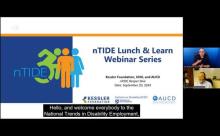
Join us for a "Deeper Dive" into Voting Issues Relevant for People with Disabilities. Using data from a population survey released mid-month, our team of experts will explore important trends and topics with guest speakers Douglas Kruse and Lisa Shur of Rutgers School of Management and Labor Relations.
nTIDE Deeper Dive September 2024: Voting Data Reflects Increased Turnout for People with Disabilities, Yet Barriers Remain
Critical steps in bridging remaining gaps include accessibility improvements and expanded access to mail-in voting
September 26, 2024 – While voting accessibility for people with disabilities has improved since 2012, a turnout gap persists, with one in seven voters with disabilities reporting difficulties in 2022. Additionally, recent rollbacks of pandemic voting measures in some states have made it harder for people with disabilities to vote in person and by mail.
Lisa Schur, PhD, and Douglas Kruse, PhD, co-directors of the Program for Disability Research at Rutgers University, highlighted significant trends in voter turnout, accessibility improvements, and ongoing challenges faced by people with disabilities in the political process during Friday’s National Trends in Disability Employment (nTIDE) Deeper Dive Lunch & Learn Webinar. nTIDE is a joint effort by Kessler Foundation and the University of New Hampshire’s Institute on Disability (UNH-IOD).
“While voting is a fundamental right and responsibility in a democracy, historically people with disabilities have been marginalized from the political process,” asserted Dr. Schur. The team compiled data from the Census Bureau’s Current Population Survey Voting and Registration Supplement and Rutgers’ national surveys funded by the U.S. Election Assistance Commission following the 2012, 2020, and 2022 elections.
Their narrative followed the 2020 general election, where voter turnout among people with disabilities surged by 5.9 percentage points compared to 2016, showing 17.7 million people with disabilities casting ballots. This accounted for 11.4% of the total voter turnout. In the 2022 midterms, the trend continued, with 15.8 million people with disabilities voting, representing 13.0% of all voters.
Despite progress, the turnout gap between voters with and without disabilities persists. “Accessibility remains a challenge,” said Dr. Kruse. In 2022, 14% of voters with disabilities reported difficulties in voting, compared to 4% of voters without disabilities. “The most significant challenges were reported by individuals with vision and cognitive impairments, with 53% of voters with vision impairments experiencing difficulties,” he added. “In addition, in-person voters with disabilities were twice as likely to require assistance compared to those without disabilities, while mail voters with disabilities were ten times more likely to need help.”
Additional research shows that the turnout gap is partly explained because of lower income and education, greater social isolation, and inaccessible polling places and voting procedures. “These barriers can also have psychological effects by sending the message that people with disabilities are not welcome in the political sphere,” Dr. Schur added.
Almost two-fifths (39%) of voters with disabilities voted by mail in 2022, compared to 31% of voters without disabilities. The pandemic greatly increased voting by mail. The increase in voting with a mail ballot between 2018 and 2022 was almost identical for voters with and without disabilities (8-9 percentage point increase). States that expanded access to mail-in voting saw the highest increases in turnout among people with disabilities between 2018 and 2022. States that adopted “no-excuse” mail voting saw a 6.9% increase in turnout among disabled voters.
“Continued efforts are essential to further enhance accessibility and voter turnout for people with disabilities. Outreach, education, and expanded access to mail-in voting are critical steps in bridging the remaining gap,” Dr. Kruse concluded.
Live Webinar on Disability and Employment
nTIDE is presented by Kessler Foundation and the University of New Hampshire’s Institute on Disability. In conjunction with each nTIDE report, experts host a 12:00 PM – 1:00 PM (ET) Lunch & Learn Webinar via Zoom featuring in-depth analyses, guest speakers, and news updates from the field. Webinars include invited panelists who discuss current disability-related findings and events.
On October 4, 2024, at 12:00 pm – 1:00 pm Eastern, join nTIDE experts Drs. John O’Neill and Andrew Houtenville and Denise Rozell, director of policy innovation at AUCD in our free Lunch & Learn live or visit the nTIDE archives at: ResearchonDisability.org/nTIDE.
Special Webinar Date October 11, 2024
Premiere of 2024 Kessler Foundation National Employment and Disability Survey: Hospitality Survey
On October 11, 2024, at 12:00 pm – 1:00 pm Eastern, findings from the 2024 Kessler Foundation National Employment and Disability Survey: Hospitality Survey will be revealed. The 2024 Survey is the fifth in a groundbreaking series aimed at gaining detailed information on ways people with disabilities achieve inclusion in the workplace. Learn firsthand about the most frequently used employment practices, their effectiveness, and real-world from supervisors. When ready, registration will be available online at ResearchonDisability.org/nTIDE
